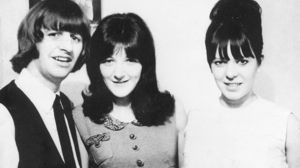Putting together a documentary that consists mostly of talking heads and still photographs is never easy, and it can too often end up an exercise in Ken Burns’ style slow zooms and pans. For Good Ol’ Freda, though, a documentary about the most photographed rock band in history, you must have expected (once the rights issues were sorted) that you’d have an embarrassment of riches. Except that your film isn’t really about The Beatles, it’s about a more peripheral figure in their history – not fifth Beatle status, maybe fifteenth or so – Freda Kelly, Beatles fan club president and secretary to Brian Epstein.
There are photos of Freda to be sure – family photos of a girl who lost her mother at a young age, the teen who went to work in a typing pool but snuck out at lunch to the Cavern Club, the girl sorting through sacks of fan mail, and standing on the edges of Beatles’ events – all with the same cheeky smile intact. It’s easy to put these in between the more familiar images and give us a chronology of the band’s rise and fall, though those without a good knowledge of Beatles’ history (should they accidentally stumble into this movie) might be a bit confused. I know you divided the film into different years of the sixties, but Freda, a good storyteller, does jump around a bit in her telling, and it would be wrong of the film not to follow her. Fortunately you have the Beatles’ music itself to move the film along at a good clip.
The difficulty in thinking of this film as a story of The Beatles is that Freda wasn’t there for the moments we know best – the tours or the recording sessions or the arguments – what’s more, decades later she’s still refusing to gossip or even to choose a favourite Beatle. Instead Freda’s story becomes one of loyalty, and of the nature of fandom. She considers herself a fan first and foremost, and this has made her sympathetic to the fan club members she dealt with – answering their letters and trying to honour their requests, be it for autographs or hair, even bringing Ringo’s mother a pillowcase for him to sleep on and then send back to a lucky fan.
Hearing about how she replied to these letters, and enlisted The Beatles’ parents to help out, creates a picture of a time very different from now with our carefully packaged celebrities. Freda herself comes through as a dedicated and honest person, qualities that survived the tumultuous times she was in and difficulties in her own life. She remains steadfast in her refusal to cash in or tell-all, valuing privacy – her own and the band’s – above all else.
It must have hurt, as filmmaker, to find out that she gave away all but four boxes of her memorabilia and photos. But Freda doesn’t seem fussed about the small fortune she likely lost out on – everything went to fans she knew would appreciate them. Good Ol’ Freda must have been long editing process for you, Helen, having to look for the people on the edges of the photographs and wonder who they were and what their stories were, but it certainly was a worthwhile one.
Erin







